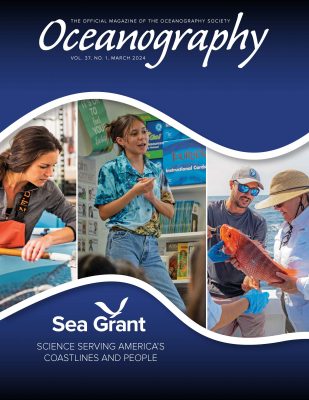 NOAA Sea Grant-funded research and work with coastal and Great Lakes communities across the nation are being highlighted in a special issue of Oceanography, the official journal of The Oceanography Society.
NOAA Sea Grant-funded research and work with coastal and Great Lakes communities across the nation are being highlighted in a special issue of Oceanography, the official journal of The Oceanography Society.
This special issue, published in April 2024, features 36 articles contributed by Sea Grant authors across 29 programs and the National Sea Grant Office. Among the contributors are CT Sea Grant’s Extension Educator Emerita Juliana Barrett, and Communications Coordinator Judy Benson.
The articles cover a diverse range of topics including projects that advance aquaculture, marine debris research, green infrastructure, science communication and community partnerships, highlighting the wide scope of contributions Sea Grant makes to the environmental and marine sciences.
Read the full special issue here.
Request a copy of “University of Connecticut’s Climate Corps Promotes Undergraduate Workforce Development and Climate Adaptation,” by Juliana Barrett and Chester Arnold, by emailing: Judy.Benson@uconn.edu.
Request a copy of “Can We Live In Kinship with the Ocean?” by Judy Benson, by emailing: Judy.Benson@uconn.edu.
Sea Grant’s work is community-based, with Sea Grant professionals co-developing projects that support and enhance coastal and Great Lakes communities across the United States. In 2022, the network returned a $802.3 million economic benefit on a federal investment of $89.5 million—a nearly $10 return on every dollar invested—by creating jobs and businesses, leveraging additional funds for research, education and outreach, and creating volunteer ambassadors who conduct participatory science and other work to benefit their communities.
“Sea Grant’s success and impact will continue to rely on the power of collaboration,” said Jonathan Pennock, director of the NOAA’s National Sea Grant College Program. “This special issue showcases and celebrates the breadth of Sea Grant’s work. The articles in this special issue highlight projects from across the Sea Grant network and include contributions from 175 authors and over 50 external partners.”
Sea Grant funds research, outreach, education and extension work in four focus areas: healthy coastal ecosystems, environmental literacy and workforce development, sustainable fisheries and aquaculture, and resilient communities and economies. Inclusivity principles are woven into every facet of Sea Grant’s work, inspiring a sense of belonging and unity for the communities served.
Healthy Coastal Ecosystems
The Sea Grant network addresses numerous environmental challenges in coastal and Great Lakes ecosystems. Sea Grant professionals’ expertise in research, education, and outreach is instrumental in ecosystem management across multiple regions and communities. Projects such as the “Skip the Straw” campaign on South Bass Island, Ohio tackle plastic pollution through local partnerships and education, while Sea Grant’s contributions to ocean and coastal acidification research highlight the program’s role in advancing scientific understanding and policy recommendations. Discussions on blue carbon resources underscore Sea Grant’s interdisciplinary approach to climate change mitigation and financing coastal restoration efforts. Through these diverse endeavors, the Sea Grant network continues to play a vital role in promoting environmental stewardship and resilience in coastal communities.
Environmental Literacy and Workforce Development
The diverse education and training initiatives funded by Sea Grant foster sustainability, enhance workforce readiness and address climate change impacts across the United States. Environmental literacy and teacher professional development projects use various approaches including integrating Western science and cultural teachings, employing project-based learning, incorporating new technologies in engineering and ocean science, and emphasizing science communication and lesson plan design.
Workforce development initiatives address the practical aspects of climate adaptation and green infrastructure through community engagement and technical training for students and professionals. Similarly, education and training assist the oyster aquaculture industry’s efforts to address labor challenges and environmental threats.
Sustainable Fisheries and Aquaculture
Sea Grant has an extensive history of supporting fisheries and aquaculture development, from enhancing production methods to sustaining economic impacts and Indigenous values. Research contributes to understanding the decline of local shrimping communities, and the role of policy and regulation in their livelihoods. The “Return ‘Em Right” program, led by the NOAA Restoration Center in collaboration with Sea Grant and the Gulf States Marine Fisheries Commission, blends science with business principles to promote sustainable catch-and-release practices for recreational fishing in the Gulf of Mexico. This program addresses issues like barotrauma through innovative approaches and community engagement. Sea Grant also funds surveys and needs assessments to assist in climate research, policy, and decision-making. These and other efforts demonstrate Sea Grant’s commitment to fostering resilience, sustainability, and community-driven conservation practices across the fishing, aquaculture and seafood industries.
Resilient Coastal Economies
Sea Grant programs contribute to building resilient coastal communities and economies while addressing the complex challenges posed by climate change and environmental degradation. Efforts to enhance coastal resiliency include green infrastructure implementation, like developing living shorelines in coastal areas. Reference materials developed by Sea Grant programs highlight the importance of proactive strategies for hazard mitigation and recovery. Sea Grant programs also play a crucial role in engaging communities through education, outreach, and participatory science projects, fostering collaboration among interested parties and promoting sustainable practices in industries like shipping and port management.
Ultimately, this special issue is a reflection of Sea Grant’s scientific contributions and a look towards what is to come. Mona Behl, associate director of Georgia Sea Grant and a contributor to the special issue, said she hopes this issue will inspire new opportunities.
“Sea Grant is just one of many organizations that is committed to increasing the usefulness of science for societal good,” Behl said. “We invite readers of this special issue to join us in envisioning new pathways for collaboration, impact and innovation to propel towards a future where scientific advancements are accessible, equitable and transformative for all.”